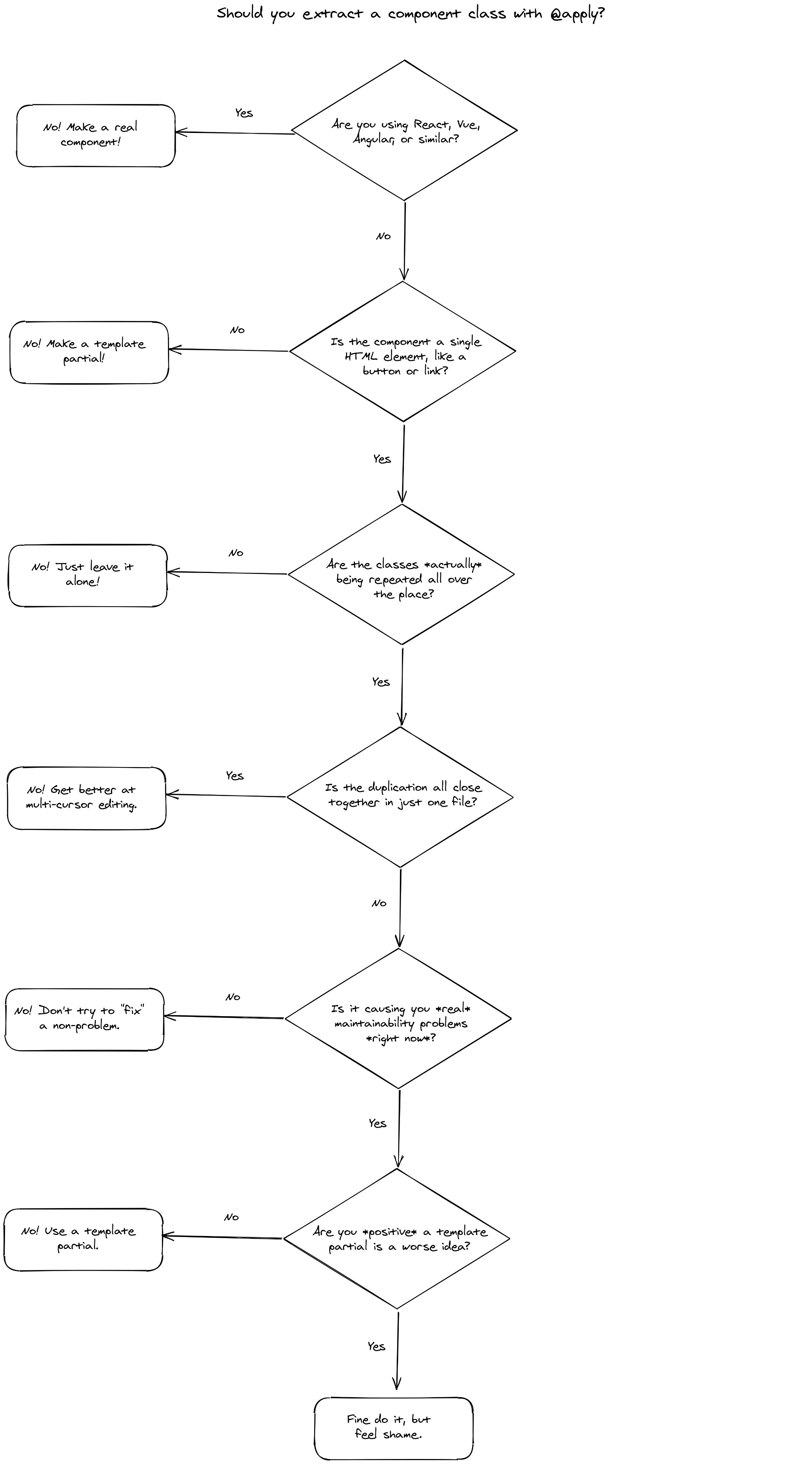Classmate is here to help with HTML class composition and is especially useful when paired with a utility-first css framework, such as Tailwind CSS.
template.twig
<h2 class="text-lg leading-6 font-medium text-gray-900 mb-3">
Some reusable heading…
<a href="#" class="text-orange-600 hover:text-orange-900">A link</a>
</h2>template.twig
<h2
class="{{ classmate.get('myHeading').remove('text-gray-900').add('mb-3', 'text-gray-400') }"
>
Some reusable heading…
<a href="#" class="{{ classmate.get('defaultLink') }}">A link</a>
</h2>classmate.json
{
"myHeading": "text-lg leading-6 font-medium text-gray-900",
"defaultLink": "text-orange-600 hover:text-orange-900"
}My opinons about Extracting component classes with @apply are pretty well summed up by this tweet:
In short, I tend to avoid @apply when possible.
Classmate was created specifically for single element components (e.g. button, link, heading), where extracting to a template partial may be cumbersome and you still want to avoid @apply.
How is this better than @apply? Aren't we just moving problem elsewhere?
Yes and no. It is true that the practice of extracting components with @apply is similar to defining classes in classmate JSON file. However, Classmate abstracts the definition on the backend (PHP), while @apply abstracts it as part of the front-end build. Advantages to this are:
- No additional CSS bloat from component classes
- No added compile time from
@apply - Your resulting HTML remains all-utility. Onboarding a new developer to project, especially if they're already familiar with Tailwind or whatever framework, is much easier if they don't have to decipher a set of component classes.
- Errors are more easily caught.
- With an extracted component, misuse can happen easily and go unnoticed, e.g. a typo in your class attribute. With Classmate, when a class definition is missing, it is readily apparent to the developer.
- Config can be shared with frontend JS.
Copy ./src/config.php to <yourProject>/config/classmate.php.
The location of your Classmate file. Aliases and environment variables are supported.
Defaults to @config/classmate.json, but I suggest you put it alongside your pre-compiled frontend assets, e.g. ./src/css/classmate.json
If using Tailwind or PurgeCSS directly, you will also want to include this path. E.g.
tailwind.config.js
module.exports = {
purge: {
content: [
"./src/**/*.css",
"./src/**/*.js",
"./templates/**/*.*",
"./config/tailwind.json",
],
options: {
safelist: [],
},
},
};Your Classmate file is a JSON file with a single object. The values can be space separated strings or arrays, or a combination of both.
{
"heading1": "text-2xl font-bold",
"heading2": ["text-lg", "font-bold"],
"buttonBase": [
"text-center inline-flex items-center justify-center font-bold",
"rounded-full"
],
"buttonWhite": "bg-white text-gray-900",
"buttonLg": "leading-none text-xl py-4 px-8",
"buttonSm": "leading-none text-sm py-2 px-4",
"centerX": "left-1/2 transform -translate-x-1/2",
"centerY": "top-1/2 transform -translate-y-1/2"
}Since this is just a JSON file, it is easily consumable by Javascript, too!
import classmate from "../../config/classmate.json";
document.querySelector("body").class = classmate.body;{{ tag('a', classmate.get('defaultLink').asAttributes({
text: 'A link'
href: '#'
})) }}Craft 3.6+ only
{% tag('a', classmate.get('defaultLink').asAttributes({href: '#' })) %}
A link
{% endtag %}<a {{ attr({
href: '#'
class: classmate.get('defaultLink').asClasses()
}) }}>A link</a>{% set tag = '<a href="#">' %}
{{ tag|attr({
class: classmate.get('defaultLink').asClasses()
}) }}<a href="#" class="{{ classmate.get('defaultLink') }}">A link</a>classmate is a chainable API, available as a global in your Twig templates.
Retrive classes of given $keys from your classmate file. Multiple keys will be merged right to left.
{{ classmate.get('buttonBase', 'buttonLarge', 'buttonBlue') }}Retrive an array of classes. Duplicates and empty values are removed.
<div {{ attr({
class: classmate.get('foo').asClasses()
}) }}">Retreive an attr-compatible iterable, with class set, merged into any passed $attributes.
<div {{ attr(classmate.get('foo').asAttributes({
id: 'buttonLarge'
})) }}">Add classes to the current ClassList.
{{ classmate.get('foo').add('mb-4') }}Remove classes to the current ClassList.
{{ classmate.get('foo').remove('mb-4') }}Filter the current ClassList, keeping those that match $pattern.
{{ classmate.get('foo').matching('/^text-/') }}Filter the current ClassList, removing those that match $pattern.
{{ classmate.get('foo').notMatching('/^mb-/') }}Replace $search with $replace. Set $partial to true to match partial strings, otherwise only complete matches will be replaced.
{{ classmate.get('foo').replace('text-red-500', 'text-red-100') }}
{{ classmate.get('bar').replace('md:', 'lg:', true) }}Prepend $string to each item in the ClassList.
{{ classmate.get('foo').prepend('md:') }}Append $string to each item in the ClassList.
Retrival of the JSON file is cached, and invalidated by modifications to the file, so you really shouldn't have to worry much about invalidation. However, you can selectively clear the cache via the CP or with the CLI command:
./craft clear-caches/classmate-cache- Craft CMS 3.0+
- PHP 7.4+
composer require timkelty/craftcms-classmateYou can't! …yet. @markhuot alluded to this here: https://twitter.com/markhuot/status/1351605237736419329
A Tailwind/Postcss plugin might allow something like:
E.g. you write
.prose a {
@classmate foo, bar;
}…to grab classes the same what that classmate.get('foo', 'bar') would.
I'd love to allow the use of arrow functions, but Twig currently doesn't allow it.
For example, instead of our matches and prepend methods, I'd rather have:
classmate.get('foo').filter(c => c starts with 'f')
classmate.get('foo').filter(c => c matches '/^f/')
classmate.get('foo').map(c => "md:#{c}")While this works for Twig's map, filter, and reduce filters, it doesn't work here. See twigphp/Twig#3402
I don't really have a desire for this, but happy to accept a PR if someone wants to add this.

